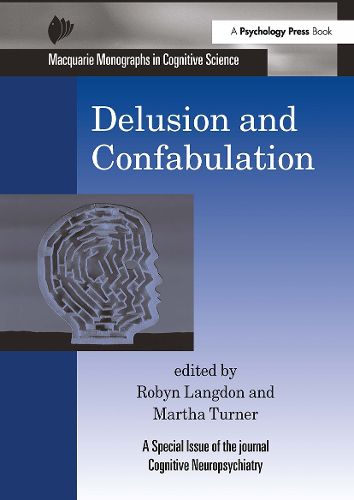Readings Newsletter
Become a Readings Member to make your shopping experience even easier.
Sign in or sign up for free!
You’re not far away from qualifying for FREE standard shipping within Australia
You’ve qualified for FREE standard shipping within Australia
The cart is loading…






People with psychiatric and neurological illness sometimes say and think the most amazing things. They might believe they are dead; claim to see, despite being blind; or "remember" things that never happened. Historical demarcations between academic disciplines dictate that these are distinct clinical phenomena - 'delusion', 'anosognosia' (the delusional denial of illness on some accounts) or 'confabulation'. This Special Issue brings together leading researchers from diverse fields - memory researchers, clinical neuropsychologists, psychiatrists, cognitive scientists and philosophers - to consider the extent to which these different phenomena overlap. Opinions differ. Some researchers use the term confabulation very generally to refer to false claims whether these concern belief or memory. Other researchers advocate an exclusive approach, according to which no symptom could ever qualify as both delusional and confabulatory. Yet others focus on points of similarity and argue that historical discord between psychodynamic and cognitive neuroscientific approaches has obscured similarities with regard the roles of emotion and motivation. Some contributors highlight both difference and similarity; they consider points of overlap - the instances of confabulation which qualify as delusional - or advocate a common monitoring framework to explain all distortions of reality. Despite their differing views, our contributors all share the common aims of clarifying theoretical conceptions, evaluating similarities and differences, and learning more about underlying causal mechanisms so as to advance the cognitive neuropsychiatry of both delusion and confabulation.
$9.00 standard shipping within Australia
FREE standard shipping within Australia for orders over $100.00
Express & International shipping calculated at checkout
People with psychiatric and neurological illness sometimes say and think the most amazing things. They might believe they are dead; claim to see, despite being blind; or "remember" things that never happened. Historical demarcations between academic disciplines dictate that these are distinct clinical phenomena - 'delusion', 'anosognosia' (the delusional denial of illness on some accounts) or 'confabulation'. This Special Issue brings together leading researchers from diverse fields - memory researchers, clinical neuropsychologists, psychiatrists, cognitive scientists and philosophers - to consider the extent to which these different phenomena overlap. Opinions differ. Some researchers use the term confabulation very generally to refer to false claims whether these concern belief or memory. Other researchers advocate an exclusive approach, according to which no symptom could ever qualify as both delusional and confabulatory. Yet others focus on points of similarity and argue that historical discord between psychodynamic and cognitive neuroscientific approaches has obscured similarities with regard the roles of emotion and motivation. Some contributors highlight both difference and similarity; they consider points of overlap - the instances of confabulation which qualify as delusional - or advocate a common monitoring framework to explain all distortions of reality. Despite their differing views, our contributors all share the common aims of clarifying theoretical conceptions, evaluating similarities and differences, and learning more about underlying causal mechanisms so as to advance the cognitive neuropsychiatry of both delusion and confabulation.